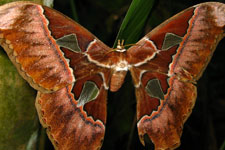Conservation liberal-arts style
Rainforest conservation, biodiversity, ecosystems — these are often thought of as falling under the domain of science. But biology professor Miles Silman, director of Wake Forest’s Center for Energy, Environment and Sustainability (CEES) knows that real change means engaging non-scientists too.
“Many people think of Amazonian conservation as just science driven,” said Silman. “But we all have a stake in it, and there are many ways of understanding nature beyond quantifying it scientifically. Data are great, but the arts and humanities make the Amazon understandable in ways that a thousand scientists couldn’t.”
This desire to connect arts with the Amazon led to the creation of JAMAZON.
JAMAZON, billed as a “jazz event of Amazon proportions,” was a germ of an idea when Silman approached Lillian Shelton, director of the Secrest Artists Series to talk about putting together a jazz concert to raise awareness for Amazon conservation. Jazz plus Amazon turned into JAMAZON and for the featured event, Shelton was able to secure the Wayne Shorter Jazz Quartet. Shorter is listed with the Amazon Aid Foundation as an “artist for the Amazon.”
“Secrest has long pursued connections with academics,” said Shelton, “but biology was a first.” Since the Secrest Artist Series was endowed in 1987 by Marion Secrest, a local performing arts patron, Shelton has been bringing world-class musicians to campus. The performances are free for Wake Forest students, faculty and staff.
In addition to the featured concert, three students will play on stage with Brian Blade, John Patricucci and Danilo Perez, members of the Quartet, as part of a workshop hosted by the music department. A Q&A will follow.
Other events include a slideshow and lecture by National Geographic photographer Sam Abell, a talk by Karen Pinkus, entitled “No Return: The Humanities Confront Climate Change” and screenings of the award-winning documentary film, “Amazon Gold.” A complete schedule is available on the JAMAZON website.
While on campus, Pinkus will meet with an interdisciplinary faculty seminar sponsored by Wake Forest University’s Humanities Institute. Faculty from religion, environmental studies, history, English, interdisciplinary humanities, and biology are working together this year to examine the human dimensions of sustainability and lay the groundwork for a new project that will address the relationships between space, place and community identity, as well as environmental awareness in the region.
“Multi-disciplinary work is critical if we are to progress in our efforts towards sustainability,” said religion professor Mary Foskett, who directs the Humanities Institute. “Research at the intersection of the humanities and environmental studies is helping us take a fresh look at the knowledge bases that dictate and shape our interaction with the environment, as well as those that may be key in identifying new strategies and avenues for response.”
JAMAZON is a Secrest Artists Series event in collaboration with the Center for Environment, Energy and Sustainability, the Office of Sustainability, the Department of Music, the Humanities Institute and Interdisciplinary PLACe. The opportunity to contribute to the Amazon Aid Foundation will be available at all JAMAZON events.
Categories: Arts & Culture, Environment & Sustainability, Global Wake Forest, Happening at Wake, Research & Discovery
Media Contact
Wake Forest News
media@wfu.edu
336.758.5237




